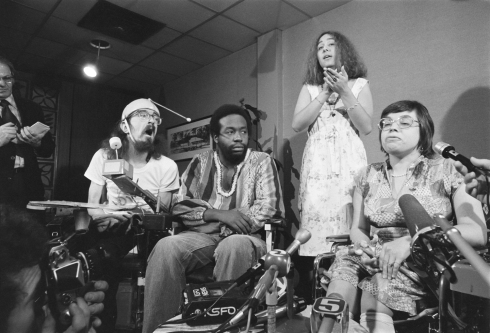 On a spring day in April 1977, hundreds of disabled American demonstrators in Washington D.C., New York, Denver and San Francisco, demand new President Jimmy Carter’s administration implement Section 504 of the Rehabilitation Act of 1973, protecting the rights of all people with disabilities. Joseph Califano, the HEW (Health, Education, and Welfare) Secretary, promises to sign the regulations after further review, though his task force has no one representing the disabled on it. In response, San Francisco-based disability rights activist Judy Heumann (30) with help from San Francisco campaign organizer Kitty Cone, stages a spontaneous Sit-In with over 150 other disabled demonstrators on the fourth floor of the old Federal building. Judy demands Secretary Califano sign the regulations now and demonstrators across the nation take Judy’s cue and also stage Sit-Ins. The media begins 24 hour live coverage outside federal buildings in each city where “the occupation army of cripples has taken over.”
On a spring day in April 1977, hundreds of disabled American demonstrators in Washington D.C., New York, Denver and San Francisco, demand new President Jimmy Carter’s administration implement Section 504 of the Rehabilitation Act of 1973, protecting the rights of all people with disabilities. Joseph Califano, the HEW (Health, Education, and Welfare) Secretary, promises to sign the regulations after further review, though his task force has no one representing the disabled on it. In response, San Francisco-based disability rights activist Judy Heumann (30) with help from San Francisco campaign organizer Kitty Cone, stages a spontaneous Sit-In with over 150 other disabled demonstrators on the fourth floor of the old Federal building. Judy demands Secretary Califano sign the regulations now and demonstrators across the nation take Judy’s cue and also stage Sit-Ins. The media begins 24 hour live coverage outside federal buildings in each city where “the occupation army of cripples has taken over.”

Judy, who has used a wheelchair for most of her life due to polio, is a beautiful, ballsy and vivacious, smart and sassy civil rights activist. She knows the 42 words of Section 504 are worth fighting for. Passed by Congress in the Civil Rights Act of 1974, the Ford Administration failed to ever implement the act. Judy knows before the law can become effective, regulations must be issued defining who is a disabled person, and what constitutes discrimination and nondiscrimination in the context of disability. The regulations would finally provide a consistent, coherent interpretation of 504’s legal intent rather than leaving it up to individual judges to interpret. Left intact, those 42 words would end centuries of pain and suffering of the disabled at the hands of those who would judge persons with disabilities less-than human beings.

After the second night of the San Francisco sit-in, HEW officials begin cracking down. Any demonstrators who leave the federal building are not allowed back in and all the phones are shut-down except for one emergency line. On the third day, the hot water is turned off. By the fifth day, federal authorities successfully force out all the demonstrators in D.C., Los Angeles, New York and Denver. But Judy and her group hold tight in San Francisco, even as greater pressure is applied to their living situation. But even under the tough conditions, the 150 demonstrators continue their swinging 70’s lifestyle of sex, drugs and rock and roll. They’re showing they’re no different than anybody else – and that’s the entire point. They want equal rights under the law, and they are willing to suffer to get what they deserve.

Judy becomes a lightning-rod for the cause, even getting the attention and support of San Francisco Mayor, George Moscone. But try as he might to get the demonstrators concessions of food, medicine and amenities, the Mayor soon finds out the limits of his own authority when up against the feds. Meanwhile, Brad Lomax, a black protestor with MS and confined to a wheelchair, takes action. He and his care giver, Chuck Jackson, are members of the Black Panther Party. The Panthers come to the aide of the 504 Protestors and begin bringing much needed supplies and one hot meal a day to everyone inside the building. Meanwhile, the Butterfly Brigade, a group of gay men activists, and the Mission Rebels, a Chicano group, help sneak walkie-talkies into Judy so she and her organizers can communicate with the outside world. The Feds begin to realize the 504 protestors are a force to be reckoned with and won’t easily be placated.

After two weeks and escalating tensions between the U.S. Government and Judy, her fellow demonstrators, and thousands of supporters across the nation – a special congressional hearing convenes inside the federal building in San Francisco. At first, the feds are not going to allow cameras in. But Judy and her coalition refuse to participate if the media is shut out, and they get there way. The testimony of activists Ed Roberts, Debby Kaplan, Phil Newmark and others galvanize moral support. After Judy makes an impassioned speech before the committee and news cameras, the HEW representative sent by Secretary Califano from Washington gets up and locks himself in an office. Congressman Phil Burton leaps up and runs after him, kicks the door in and insists he come back out. Seizing on the opportunity, Judy announces the coalition’s next plan of action: she and 14 other disabled demonstrators including Black Panthers Brad Lomax and Chuck Jackson will travel to Washington and demand to meet with HEW Secretary Califano in person, if not President Carter himself.

Judy and her contingent touch down at Dulles airport on a sweltering-hot, late-April day. They arrive in Washington, D.C. to much fanfare. They demonstrate outside HEW Headquarters as Secretary Califano watches from inside. The stand-off continues for days as Judy and her cohorts borrow a van and go to Califano’s neighborhood. She speaks to the neighborhood kids, telling them, “Mr. Califano doesn’t want disabled kids going to school with you.” She even stakes out President Carter’s church in the hopes of meeting him. But it is only after thousands of Americans, both disabled and able-bodied, march on Capitol Hill that the President finally acts. He orders Secretary Califano to sign the regulations – all 42 words – into law on April 28, 1977.

Judy continues to be a leader in the disability rights movement after the success of the 504 Sit-In. She is there to ensure the Americans with Disabilities Act of 1990 is signed into legislation. She goes on to become the Assistant Secretary of Education for Special Education and Rehabilitative Services under President Bill Clinton, and is currently the Special Advisor for International Disability Rights under President Barack Obama. Judy lives in Washington D.C. with her husband, Jorge Pineda.

Available at Amazon


What a great story. Human triumph over bureaucracy, that isn’t easy. Direct action made it happen. Credit to the original Congressmen who cared enough to get it passed. The well heeled have lobbyists to grease the gears of government.